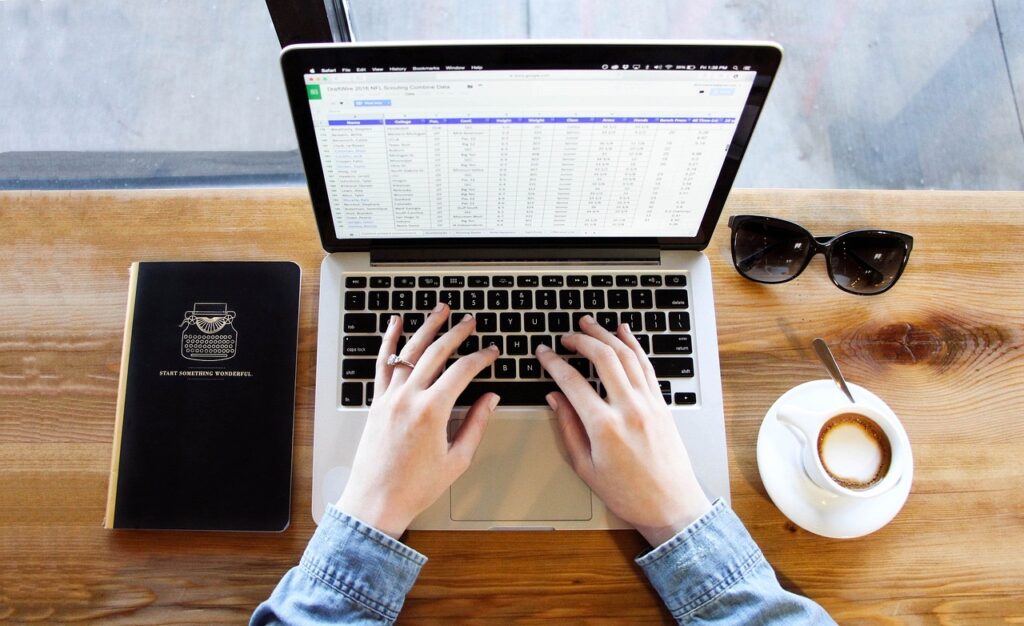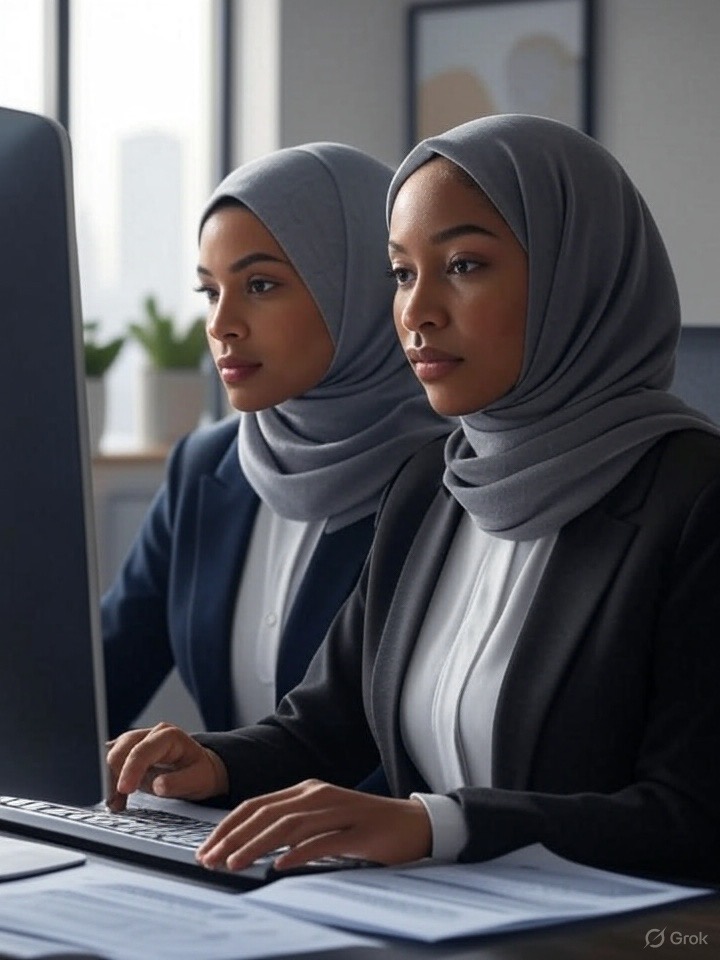
💼 Beyond the Veil:
Muslim Women Revolutionising Hybrid Workspaces with Faith and Flexibility
Islam has a clear view on women working and being financially independent. What the Quran says:
“For men is a share of what they have earned, and for women is a share of what they have earned” (Quran 4:32).
This divinely commanded economic agency emerged in early Muslim society through leaders such as Khadijah (RA), a merchant who employed Prophet Muhammad (before the Prophethood) and oversaw trade between countries, and Shifa bint Abdullah (RA), who was appointed by Caliph Umar (RA) to manage the markets in Medina. These examples from the past disprove the idea that religion and work are incompatible in today’s world.
Table of Contents
Why do muslim women wear hijabs:
How to Deal with Hijab Discrimination: How to Balance Faith and Prejudice
Studies show Western companies are less likely to call back people who wear hijabs (about 40% less likely).
“Allah does not look at your appearance but at your hearts and deeds” (Sahih Muslim 2564c).
Faith-Driven Solutions in Action:
Hijab-Friendly Business Rules: Dress rules that include people of all faiths are used by
Companies like Microsoft and Dow.
Spiritual Resilience: Internalising Quran 49:13: “The most noble of you are the most righteous” is a way to build spiritual strength.
Table: Hijab Discrimination Response Framework
| Challenge | Islamic Principle | Action Strategy |
| Biased Hiring | Divine worth in taqwa (Q49:13) | Document incidents; pursue legal redress |
| Workplace Microaggressions | Patient perseverance (Q16:127) | Faith-sensitivity training advocacy |
| Promotion Barriers | Justice advocacy (Q4:135) | Mentorship programs for Muslim women |
🌐 Faith-Friendly Remote Work: Islamic Wisdom Meets Digital Innovation

Prophetic Precedent for Flexibility
Signs of the Future for Flexibility
Strategic flexibility is a key idea in hybrid work, and the Treaty of Hudaybiyyah is a great
example of it. Some modern options are:
Digital Prayer Platforms: “PrayerSpace” and other apps sync work blocks with prayer times.
Virtual Modesty Zones are meeting rooms in VR where characters respect the hijab’s edges.
Productivity Frameworks in the Quran: Using the “gentle speech” in Quran 20:44 in internet conversations. Endorsements from Scholars:
Scholarly Endorsements:
Modern fatwas allow working from home when it:
Keeps family responsibilities in check.
Keeps things from mixing too much
Sticks to Islamic morals when doing business.
Through instances such as Khadijah’s (RA), Muslim women have consistently demonstrated that their faith enhances their labour capabilities rather than impedes them. Their unique concepts are founded on the Quran’s justice and the wisdom of the Prophets, rendering their workplaces sacred. The act of Sacred defiance is exemplified by every policy that promotes justice, every design that respects human dignity, and every honest conversation.
“When Allah makes your job easier, accept the tools He gives you” (adapted from Musa’s prayer, Quran 20:25-28).
👗 Modest Fashion Tech: Where Giving People Power Meets Entrepreneurship
Revolutionising a Business
Muslim women are in charge of a $300 billion market for modest clothing, thanks to new ideas like
Smart fabrics
Smart fabrics include hijabs that control body temperature and have sensors built in.
Virtual Try-On:
Virtual Try-On: Tech: fitting rooms driven by AI that respect modesty
Blockchain Transparency:
Blockchain Transparency: Apps that check the halal production chain
Why do muslim women wear hijabs:

Foundations for Business in the Quran:
The Quran (4:32) recognises women’s economic agency.
And do not crave what Allah has given some of you over others. Men will be rewarded according to their deeds and women ˹equally˺ according to theirs. Rather, ask Allah for His bounties. Surely Allah has ˹perfect˺ knowledge of all things.
This is in line with Quran 2:195, which says, “Do not throw yourselves into destruction” through exploitative labour.
A Quranic Framework for Balancing Work and Life
“Allah does not burden any soul beyond its capacity” (Quran 2:286)
Examples of real-world applications are:
Flexible scheduling: planning work around prayer and family time with permission from the boss
Micro-sabbaticals: Taking 15-minute breaks at work to read the Quran
Family-Centric Entrepreneurship: Home-based businesses that keep the peace at home,
In line with the Prophet’s (PBUH) focus on motherhood
Scholars say that work-related activities must:
1-Not ignoring main parental roles when it’s appropriate.
2- Be humble when you’re using technology.
3- Do something good for the community (maslaha).
Conclusion:
The Quranic energy is shown in the hybrid workspace change led by Muslim women:
“Allah does not change a people’s condition until they change themselves” (Quran 13:11)
From Khadijah’s (RA) Camels to digital startups, Muslim women continue to show that their faith doesn’t hinder their work; it enhances it. By basing new ideas on the justice in the Quran and the wisdom of the Prophets, they turn workplaces into places of worship. Every honest email, every design that respects human dignity, and every policy that fights for fairness becomes an act of holy resistance.
FAQ:Beyond the veil
1- Does the hijab have to be worn in Islam?
A-Yes, according to the Quran (24:31) and the Hadith (Sahih Bukhari 4481), both of which are reliable sources. A lot of scholars agree on this, and all four Sunni madhabs agree on it for women over the age of puberty.
2-Why do Muslim women wear the hijab if it’s “oppressive”?
A-Hijab means freedom, not oppression:
Does not agree with making women too sexual (Quran 33:33)
Attention is now turned to intelligence and character (Hadith: “Allah values your piety, not your appearance” – Muslim 2564)
Allows for greater control over how one looks: 81% of hijabis in Western countries say they wear them voluntarily (Pew Research 2023)
3-Changes are allowed by scholars under certain conditions:
A-Medicine: In an emergency, they can help male patients.
For sports and firefighting, special modest outfits are needed.
Never just for ease of use or social pressure (Quran 33:59).
4-How do hijabis respond to workplace discrimination?
A-Strategy. Islamic Basis.
Legal action Quran 4:135 (“Stand firmly for justice”)
Entrepreneurship Following Khadijah’s (RA) business legacy
Education campaigns Prophet’s (PBUH) dialogue with non-Muslims
